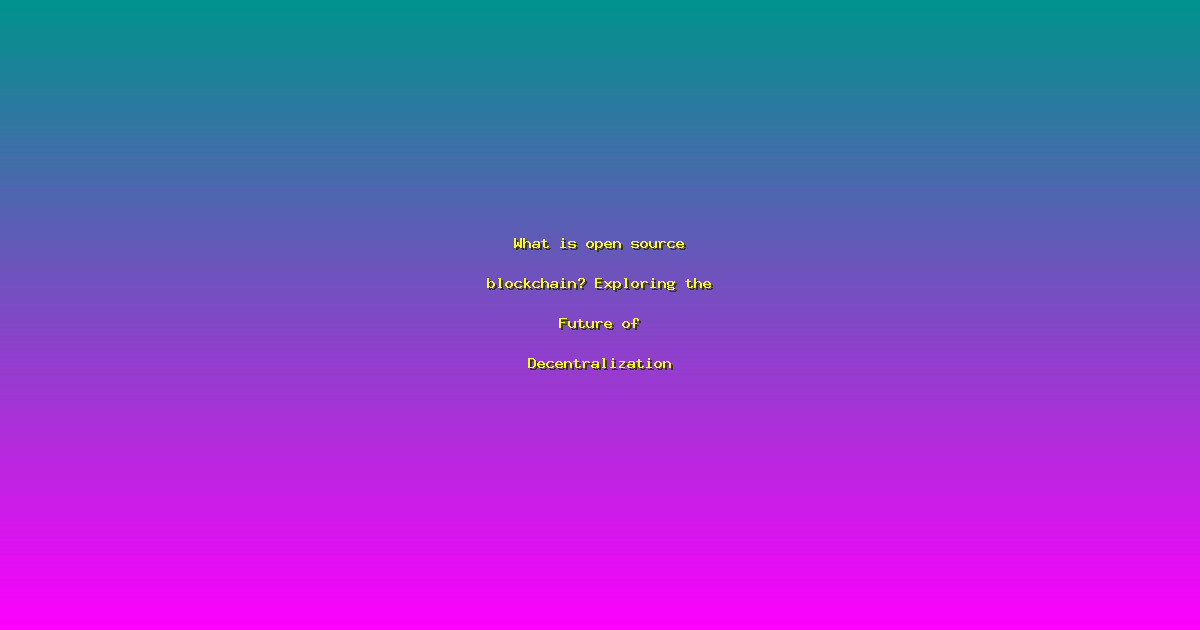What is Open Source Blockchain? Exploring the Future of Decentralization
Blockchain technology has rapidly evolved since its inception, with open source blockchain leading the charge towards a more decentralized future. This article delves into the concept of open source blockchain, its benefits, and its potential to reshape industries and empower individuals.
Understanding Open Source Blockchain
Open source blockchain refers to blockchain technology that is freely accessible to the public. Developers around the world can view, modify, and distribute the source code, fostering innovation and collaboration. This transparency ensures that the technology remains resilient against tampering and abuse, as any attempt to alter the blockchain's integrity can be detected and corrected by the community.
The Benefits of Open Source Blockchain
One of the most significant advantages of open source blockchain is its potential for democratizing access to technology. By providing a platform for collaboration, it empowers developers to contribute to the evolution of blockchain in ways that proprietary systems cannot. This democratization not only accelerates innovation but also ensures that the technology remains adaptable to the needs of the global community.
Enhanced Security and Transparency
Transparency is a cornerstone of blockchain technology, and open source blockchain amplifies this aspect by allowing anyone to review the code. This scrutiny helps in identifying and fixing vulnerabilities, making the system more secure and resilient against attacks.
Community-Driven Development
Unlike closed systems, open source projects thrive on community contributions. This collaborative approach not only fosters innovation but also ensures that the technology evolves in a way that benefits the majority, rather than a select few.
Frequently Asked Questions
1. How is open source blockchain different from other blockchain technologies?
Open source blockchain is different because it is freely accessible to the public. Developers can view, modify, and distribute the source code, which isn't the case with proprietary blockchain technologies.
2. Can anyone contribute to an open source blockchain project?
Yes, one of the core principles of open source software is community involvement. Anyone with the relevant skills and interest in contributing can do so.
3. What are some examples of open source blockchain projects?
Examples include Ethereum, Bitcoin, and Hyperledger. These projects offer different functionalities and are used in a variety of applications, from cryptocurrencies to smart contracts.
4. How does open source blockchain impact the future of decentralized applications?
Open source blockchain is pivotal in fostering a more decentralized and secure environment for applications. It enables developers to build on top of existing technologies, creating more robust and innovative applications.
5. What challenges does open source blockchain face?
Despite its benefits, open source blockchain faces challenges such as ensuring quality control in contributions, managing the pace of technological development, and integrating with traditional systems.
Conclusion
The future of blockchain is undeniably intertwined with the principles of open source. By embracing collaboration and transparency, open source blockchain is paving the way for a more decentralized and equitable technological landscape. As we continue to explore and innovate, the potential for open source blockchain to transform industries and empower individuals is truly exciting.
Are you interested in learning more about how you can contribute to or benefit from open source blockchain? Explore more resources and communities dedicated to open source blockchain technology today.

